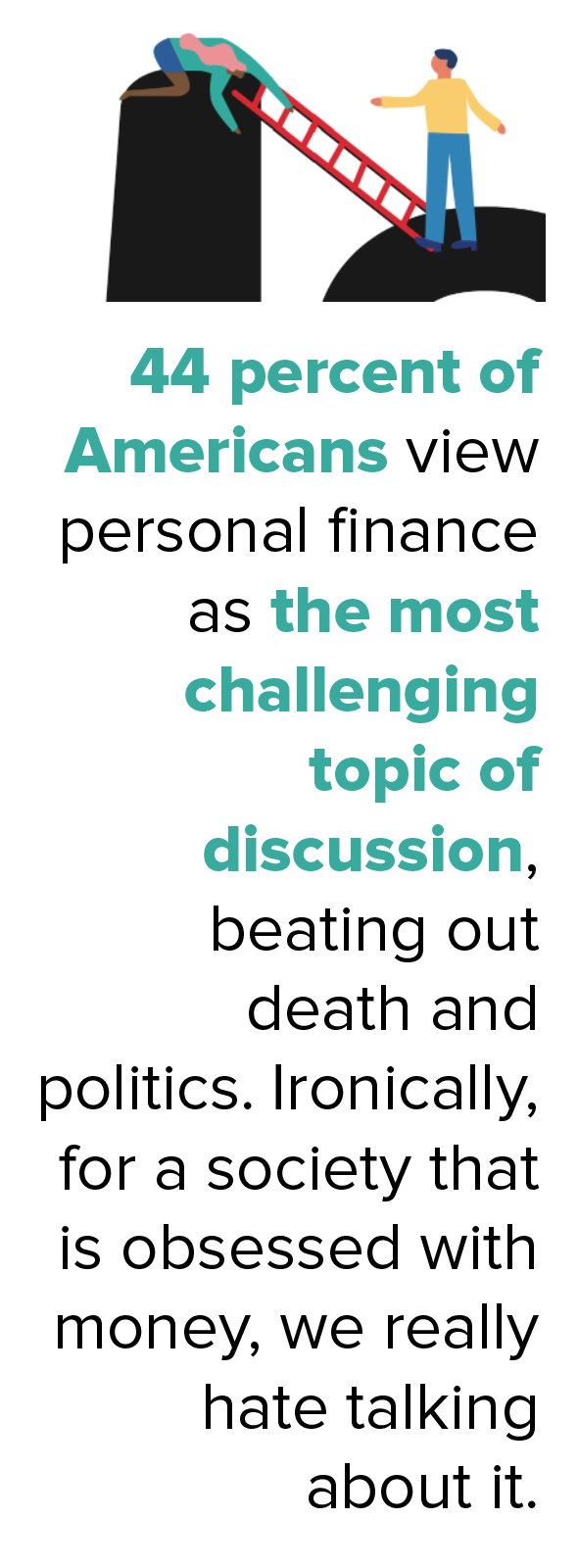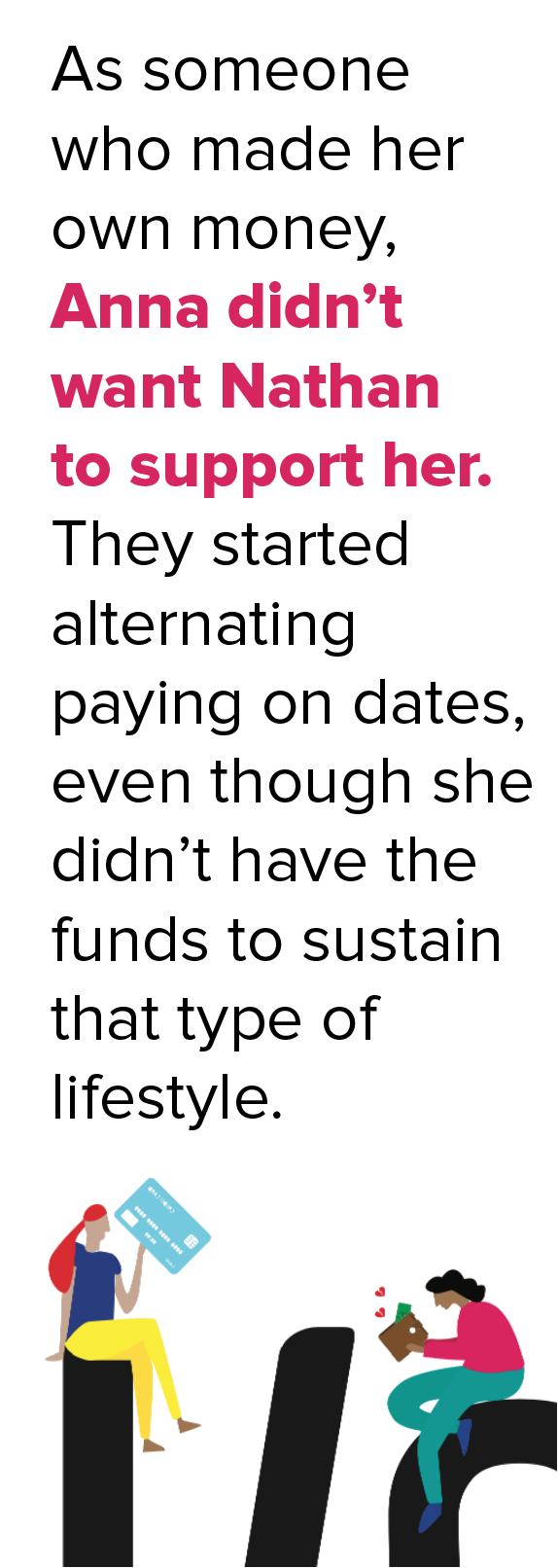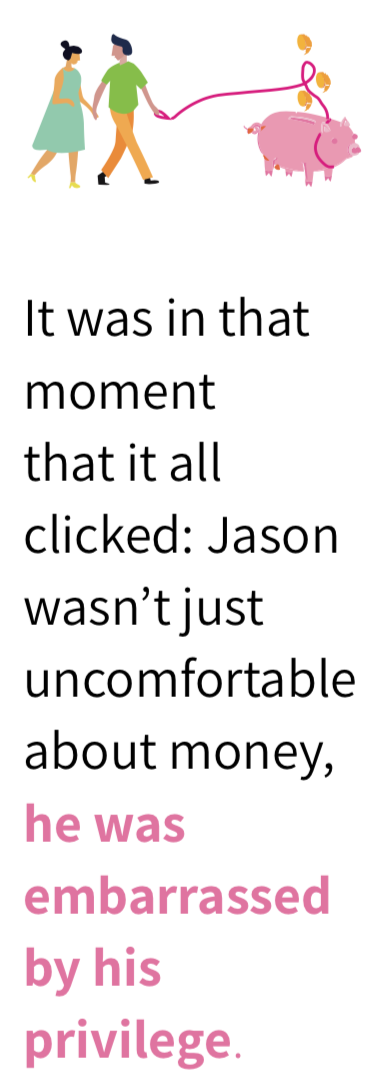Talking to your partner about finances is awkward. Here’s why it is — and why it doesn’t have to be.
Illustrations by Sarah Zhang
As she waits for the hotel Wi-Fi to connect, Laura’s* eyes drift to her shoes. In the three months since she landed in Havana, her blue Converse have adopted a dull gray color from the treks to convenience stores for water, the climbs up 13 floors when the elevator stops working and the journeys to the random hotel lobby she visits every few days for spotty internet access.
 When Laura finally gets a bar of service, she opens the email app, scrolls past spam and searches for Jason’s* name. Even though they’ve been dating for seven months, she’s barely heard from him since going abroad.
When Laura finally gets a bar of service, she opens the email app, scrolls past spam and searches for Jason’s* name. Even though they’ve been dating for seven months, she’s barely heard from him since going abroad.
“I would expect there to be something there and there wasn’t always,” Laura remembers. “I wrote these really long emails … and he just … didn’t respond.”
She knows part of his silence has to do with the unreliable connection, but she detects an emotional disconnect as well. Before she’d left for the summer, Laura shared difficult news: Northwestern adjusted her financial aid package, raising her expected family contribution for tuition to $20,000.
“I was really concerned about whether I’d be able to come back to school,” she says. “I remember talking to [Jason] about it, and he just disappeared. He wouldn’t talk about it. He was obviously concerned, but he didn’t know how to tell me.”
And so, this past June, she left for a foreign country with shaky connections to short-term internet access and a long-term boyfriend. Sitting in the Hotel Presidente lobby every few days, Laura realized something painful: money is one of the hardest subjects to talk about with a partner, especially when dating someone from a different social class, but having those conversations can make or break a relationship.
An Invisible Division
Northwestern is home to students from every rung of the social class ladder, though just eight percent of students come from the bottom 40 percent of household income, according to the New York Times. We may be pushed to mingle with people from different financial backgrounds, but on a college campus, wealth — or lack thereof — is not always obvious.
“At Northwestern, you have students who are from multiple generations of wealth sitting next to people who are first-generation college students from a very blue-collar family,” says Dr. Alexandra H. Solomon, a couples therapist at the Family Institute at Northwestern.
“But if you just look at them, they look the same. College campuses sometimes make socio-economic differences look a little bit invisible.”
As well as coaching couples, Dr. Solomon teaches Northwestern’s famous Marriage 101 class, which shares enough lifechanging advice to give Russian Lit a run for its rubles. Assignments include asking other students on dates and interviewing couples. Solomon says that, in a nutshell, the class proves that the way we are raised creates a blueprint for our connections later in life.
“[It’s about] helping people understand that your early experiences become the pair of glasses through which you experience intimate partnership,” she says.
These early experiences are colored by our religion and traditions, but also by the neighborhoods we grew up in, the schools we attended, and the allowance our parents gave us — or didn’t. A 2014 survey by Wells Fargo found that 44 percent of Americans view personal finance as the most challenging topic of discussion, beating out death and politics. Ironically, for a society that is obsessed with money, we really hate talking about it.
 “Race, faith and other differences tend to be salient and talked about a little more readily than socio-economic difference,” Solomon says. “But [money] shapes so much around expectation around how you spend time, around worldview.”
“Race, faith and other differences tend to be salient and talked about a little more readily than socio-economic difference,” Solomon says. “But [money] shapes so much around expectation around how you spend time, around worldview.”
Because it reaches all corners of our perception, money is the leading cause of stress in relationships. Even though it’s the most common reason couples get divorced, 40 percent don’t discuss financial management before getting married, according to experts. This might seem far away, since most of us aren’t looking for marriage at this stage of life, but we still seek a deep connection with our partners.
Anna* arrived at Northwestern with this kind of connection with her long distance boyfriend, Nathan.* The couple met through mutual friends in an upperclass Kansas suburb. Nathan drove a BMW, got $400 a week in allowance and went to a private school that cost $40,000 a year. Anna knew Nathan came from money, but she would never dare to ask his parents’ salary or inquire the price of his house, which sat across the street from a country club golf course.
“I waited a long time to talk about money,” Anna remembers. “I didn’t know what to do. It’s a very uncomfortable conversation to have. I think I waited until a year and a half in to say we needed to level out, monetarily.”
The final straw was an unpurchased plane ticket. Nathan asked Anna to come on his family trip to Europe, but he didn’t offer to cover the cost of tickets. Though she technically had enough money saved, Anna didn’t want to throw her entire summer’s earnings toward one whirlwind week in Croatia. That’s what she told Nathan, but it’s not what he heard. “He thought I just didn’t want to go,” Anna says. “He refused to believe me.”
According to Anna, Nathan couldn’t dissociate her commitment to him with her commitment to the Europe trip. “It was embarrassing,” she remembers. “But it was also frustrating that this boy had never experienced monetary troubles in his life and refused to acknowledge that they existed for other people.”
Anna and Nathan eventually broke up, and though their last fight wasn’t explicitly about money, their economic tensions were never quite resolved.
The Paradoxical Shame of Privilege
In the months before she left for Cuba, Laura slowly uncovered clues about Jason’s financial background. At first, she knew only that he came from an affluent suburb. Then, she started to hear the way he scoffed at other people from his high school, desperate to differentiate himself from their overt displays of wealth. It was in that moment that it all clicked: Jason wasn’t just uncomfortable about money, he was embarrassed by his privilege.
This phenomenon isn’t an anomaly, especially at a school with a majority upper-class student body. Unwilling to be defined by their parents’ bank accounts, affluent students sometimes downplay their socioeconomic status, according to Solomon. But this can mean hiding a part of your life from your partner, and ultimately, it can cause problems in relationships beyond the money itself.
Nationwide, it’s common to get monetary assistance from family. According to a poll of over 1,000 U.S. adults with children aged 18 or older, three out of four parents help college students pay debts and living expenses, including rent, utilities and cell phone bills. However, we don’t always like to admit it. “Sometimes inherited wealth can become a source of shame,” Solomon says. “Like, ‘I have this, but I didn’t earn it myself.’”
Recognizing Jason’s shame convinced Laura that it wasn’t just their relationship with each other that was causing rifts — it was also their relationship with money. If Jason had been more forthcoming, the couple may have had an open conversation about how their differing financial strata were affecting their relationship.
On the other end of the spectrum, Weinberg third year Tony is a firm believer in open conversations. He’s a candid fast-talker who doesn’t try to hide aspects of his personality; within only a few minutes of meeting him, he shares that he’s been dating his boyfriend Connor for eight months. Tony says he made a point to talk about money from day one.
“When I started bringing up money right away, it was a culture shock,” Tony recalls. “[Connor] never had somebody make fun of him for being rich before. It was weird and uncomfortable at first, but that’s just because he never talked about money growing up.”
But it isn’t in Tony’s personality to let that kind of silence simmer. He continued to mention money jokingly until Connor stopped freezing up.
“He recently told me, that for the first five weeks we were together, he felt really awkward when I’d say things like that,” Tony says. “I think talking about money, even in the form of jokes, and having an open communication about it was really helpful for both of us.”
When he says “open,” he means “not being afraid to bring it up, ever.” Professor Solomon adds that it’s important not to judge your partner for their upbringing, since fear of judgment is the origin of privilege shame in the first place.
 “Understanding your own story and your own pain points around money and privilege is super important because you’re going to play it out with your intimate partner no matter who they are,” she says. “Every one of us has a story about money and a relationship to money. What we carry inside of us feels like the good, right, normal thing, but we need to be humble and curious.”
“Understanding your own story and your own pain points around money and privilege is super important because you’re going to play it out with your intimate partner no matter who they are,” she says. “Every one of us has a story about money and a relationship to money. What we carry inside of us feels like the good, right, normal thing, but we need to be humble and curious.”
As a student with limited spending money, Tony is used to cutting some corners when he eats out.
“I’ll go to a restaurant and I’ll order my meal with water. No drink, no dessert, no appetizers or anything,” he says. “[Connor] will order a drink, an appetizer, and a main thing.”
Instead of paying the bill without questioning Connor’s choices, Tony made a joke about the disparity. The two got into a conversation about the way they were raised. Connor admitted that he didn’t look at the prices when choosing what to get; Tony realized that this was not a good or bad tendency. It was just different.
The Pretty Woman Hypothesis
In the 1990 rom-com Pretty Woman, there’s an iconic scene that depicts a curly-haired Vivian, played by Julia Roberts, entering a high-end boutique only to be turned down because of her skin-tight cutout dress and thigh-high boots. In a later scene, Vivian returns, this time decked in a designer dress with shopping bags from high-end stores dripping from her arms. She shames the workers for refusing to assist her the day before, then turns on her heel and storms away.
The difference between these two scenes is more than just an added layer of expensive clothing. Underwritten by a limitless Mastercard from her lover — and wealthy businessman — Edward, Vivian acquired a new confidence.
This climactic moment epitomizes everything we want money to be: it can make us sophisticated, happy and superior to anyone who’s ever mocked us. We view Edward as the love interest who raised Vivian out of relative poverty, like our capitalist Prince Charming.
While this movie is a cultural timepiece, the message it sends sets a poor example for anyone venturing into a mixed-collar relationship. To buy into the myth of Pretty Woman is to buy into the idea that true love is “saving” someone by providing them with financial stability. In reality, Edward’s support is an example of how saviorism creates an unbalanced power dynamic. Couples sometimes struggle with understanding their feelings when it seems like the partner with more money is paying for more dinners or buying more expensive presents. In the shadow of popular cultural tropes like Pretty Woman, we can feel uncomfortable being either Vivian or Edward.
In Anna’s experience, it’s important to make your partner feel as if their economic status is not something to escape.
“You don’t want to embarrass the other person. You can’t just come out and be like, ‘I’m being really conscientious of the fact that you have no money and I have more money than you,’” Anna says. “You have to be more conscientious of the other person’s experience and how they’ve lived their life different than yours.”
But the glamorization of money is inescapable. Movies like Dirty Dancing, The Notebook and even Shrek further romanticize dating someone of another social class, sending a message that true love transcends material situations to prevail in the end. It’s a narrative dating back to Shakespeare plays that fetishize the thrill of going against societal norms to let love conquer. It’s a story arc so common in media that it’s become synonymous with love.
As someone who made her own money, Anna didn’t want Nathan to support her. Whenever he offered to pick up the bill at expensive restaurants, she pushed to split it. They started alternating paying on dates, even though she didn’t have the funds to sustain that type of lifestyle.
“We would go to nice restaurants and eat out every meal, just because that’s what he did,” she says. “I was buying every single meal with him and hemorrhaging money when I definitely had food at home.”
She didn’t want to admit that she couldn’t afford their excessive dates, though, because she knew he’d just pay for her. Anna, and many others in her situation, felt a creeping sense of guilt because of her financial dependence.
This was amplified when giving gifts, since the spending amount was never exactly even.
 “[Nathan] always got me expensive jewelry for our anniversaries, but I’m not the kind of girl who wears jewelry,” Anna said. “I felt like he was just sort of throwing money at me, which didn’t seem as thoughtful.”
“[Nathan] always got me expensive jewelry for our anniversaries, but I’m not the kind of girl who wears jewelry,” Anna said. “I felt like he was just sort of throwing money at me, which didn’t seem as thoughtful.”
Her gift to him was socks printed with her face on them. She spent a lot of time thinking about something he would appreciate and find humorous, but when they exchanged gifts, he didn’t seem as excited as she would have hoped.
“It took a long time for him to understand the differences in money because, for him, it was something that, if you ran out, you could just reaccumilate,” Anna remembers. “For a lot of people, I feel like it takes a long time for them to understand how different peoples’ lives work.”
After dating for two years, Nathan and Anna broke up this fall. In her more recent relationships, the script occasionally flips. Sometimes, Anna’s the one with more money. Her last boyfriend sometimes poked fun at her North Face parka and Apple Watch, but, because she had been in his position before, she knew not to be offended.
“[In my last relationship,] I was in a very different position. I knew that I was the one with more money, and I never wanted to treat him the way I was treated,” Anna says. “I was very careful to talk about it with him and only do things that he was comfortable spending on. And I never, ever tried to suggest expensive things because I was trying to be better than [Nathan] was to me.”
Money Talks
Whether it’s Tony and Connor debating an appetizer, Anna and Nathan discussing flights to Croatia, or Laura and Jason dancing around the subject of financial aid, we all have one thing in common: people struggle to talk about money because they don’t want it to characterize who they are and how they are perceived by others. But when couples are open about their respective financial statuses, they at least have a chance to work through how money has influenced and continues to influence their lives. There exists a paradox of money in relationships: if you don’t talk about money because you don’t want it to define you, the avoidance of the topic will inevitably define the relationship.
“As couples move toward getting married or having a really serious commitment, couples sometimes resist talking [about money] because it seems antithetical to romance,” Solomon says. “But what’s more antithetical to romance is, ‘I married you, I didn’t know you had six figures worth of debt’... That’s really unromantic.”
There are strong, communicative couples all over Northwestern’s campus. But for Laura and Jason, they were never able to work out their differences. Eventually, they broke up. The decision came down to a lot of factors, but Laura couldn’t deny that the socio-economic rift created a lot of challenges in their relationship.
They’d been broken up for a month before Laura learned one of the reasons that Jason had been so uncomfortable about money. It turns out, his mother had been laid off from her high-paying job, and his father’s career was also in jeopardy. She and Jason had dated for two and a half years. That whole time, he’d never told her.
“I wish I would have been less afraid of asking [about money],” Laura says. “I was always too afraid to ask because he didn’t want to talk about it. But I know, going forward, that it’s a lot more important to have a clear picture of what’s going on.”
*Names changed to preserve anonymity.
